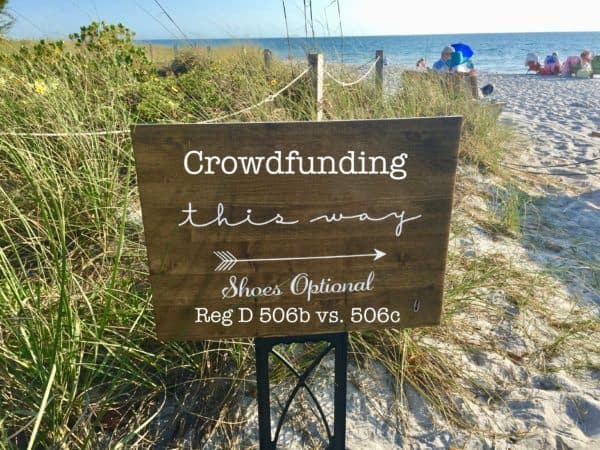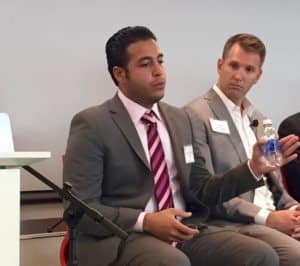
According to the Securities Act of 1933, any company that sells securities must either register with the Securities and Exchange Commission (SEC) or file for an exemption. The JOBS Act 2012 provides a way for companies to use crowdfunding as a means of selling securities, but companies using this method must still comply with existing law. Regulation D of the Securities Act exempts certain companies from registering with the SEC, however, it does require them to file a Form D, which lists the officers and other details of the company selling the securities.
 Rule 506 of Regulation D (Reg D) paves a way for companies to raise unlimited amounts of money from the sell of securities. The two components of Rule 506 are 506(b) and 506(c). Here’s what each component of this rule allow companies to do.
Rule 506 of Regulation D (Reg D) paves a way for companies to raise unlimited amounts of money from the sell of securities. The two components of Rule 506 are 506(b) and 506(c). Here’s what each component of this rule allow companies to do.
Rule 506(b) Imposes the Following Standards on Companies Selling Securities
In order to comply with the exemption rules listed in Section 4(a)2 of the Securities Act of 1933, companies using 506(b), Reg D
- cannot advertise or use general solicitation methods to market securities;
- may sell to an unlimited number of accredited investors and up to 35 other investors;
- cannot violate anti-fraud prohibitions;
- must provide non-accredited and accredited investors with the same information;
- and a company representative must be available to answer questions to prospective buyers.
Standards Imposed by Rule 506(c)
There is a slight difference between Rule 506(c) of Reg D and Rule 506(b). Companies selling securities can advertise and use general solicitation methods to find prospective buyers, however, the company can sell securities only to accredited investors. The company must also take reasonable measures to verify that investors are indeed accredited investors.
 Crowdfunding platforms that operate under Rule 506(c) typically ask investors to register as either an accredited investor or a non-accredited investor. Before allowing investors to make their first investment, platforms generally ask to review tax documents, W-2s, statements from financial institutions, credit reports, and other documents to prove that investors using the platforms are accredited investors. Penalties for not complying with Rule 506 can be stiff.
Crowdfunding platforms that operate under Rule 506(c) typically ask investors to register as either an accredited investor or a non-accredited investor. Before allowing investors to make their first investment, platforms generally ask to review tax documents, W-2s, statements from financial institutions, credit reports, and other documents to prove that investors using the platforms are accredited investors. Penalties for not complying with Rule 506 can be stiff.
Where to Find a Copy of a Company’s Form D
Securities sold under both Rule(b) and Rule(c) are considered restricted securities. While these securities do not have to be registered with the SEC, the companies issuing them must file a Form D with the SEC. This form includes the following information on the company:
- Names and addresses of company promoters;
- Names and addresses of executive officers and directors;
- And details about the securities being offered.
When a company files a Form D with the SEC, it becomes public information. You should search for and find Form D for any crowdfunding platform you wish to use to make investments, whether you intend to invest in real estate or other securities. All Form D documents can be found in the EDGAR database, which is operated by the SEC.
What Else You Need to Know About Securities Crowdfunding
 All companies that sell securities, whether through crowdfunding or otherwise, must conform with federal law regarding the selling, advertising, and solicitation of said securities. Not only that, but companies must comply with individual state laws in each state where they operate. Be sure to check with the securities regulator in your state and learn what they know about a company before you decide to purchase securities from them.
All companies that sell securities, whether through crowdfunding or otherwise, must conform with federal law regarding the selling, advertising, and solicitation of said securities. Not only that, but companies must comply with individual state laws in each state where they operate. Be sure to check with the securities regulator in your state and learn what they know about a company before you decide to purchase securities from them.
Crowdfunding is a newer asset class but is still subject to the same securities laws as other securities. Both equity-based and debt-based crowdfunding allow companies to raise capital for growth and expansion, or for particular projects. To protect yourself from bad actors, learn as much as you can about crowdfunding before you invest in or with any company.
 Allen Shayanfekr, Esq. is the CEO and Co-Founder of Sharestates.Allen is currently admitted to practice law in NY and CT. His legal expertise in securities law is paramount to Sharestates’ ability to promote and produce public and private offerings in a highly regulated space. Allen interacts regularly with the Securities and Exchange Commission, in addition to spearheading daily operations at Sharestates. Prior to launching Sharestates, Allen joined Atlantis National Services as their National Title Producer and Account Executive, holding approximately 28 Producer’s licenses across the Country. Allen’s other credentials include acting as an editor of the Municipal Lawyer (a quarterly journal published by the New York State Bar association). Allen received his J.D. Magna Cum Laude from Touro Law Center where he graduated in the top 6% of his class and his B.A. in Political Science from New York University.
Allen Shayanfekr, Esq. is the CEO and Co-Founder of Sharestates.Allen is currently admitted to practice law in NY and CT. His legal expertise in securities law is paramount to Sharestates’ ability to promote and produce public and private offerings in a highly regulated space. Allen interacts regularly with the Securities and Exchange Commission, in addition to spearheading daily operations at Sharestates. Prior to launching Sharestates, Allen joined Atlantis National Services as their National Title Producer and Account Executive, holding approximately 28 Producer’s licenses across the Country. Allen’s other credentials include acting as an editor of the Municipal Lawyer (a quarterly journal published by the New York State Bar association). Allen received his J.D. Magna Cum Laude from Touro Law Center where he graduated in the top 6% of his class and his B.A. in Political Science from New York University.

